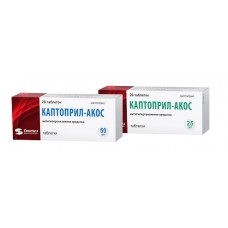Expiration date: 05/2026
Dosage form
Pills
Composition
captopril 25mg
Auxiliary ingredients: lactose, corn starch, talc, magnesium stearate
Pharmacodynamics
The mechanism of antihypertensive action is associated with competitive inhibition of ACE activity, which leads to a decrease in the rate of conversion of angiotensin I to angiotensin II (which has a pronounced vasoconstrictive effect and stimulates the secretion of aldosterone in the adrenal cortex). In addition, captopril appears to have an effect on the kinin-kallikrein system, preventing the breakdown of bradykinin. The hypotensive effect does not depend on the activity of plasma renin, a decrease in blood PRESSURE is noted at normal and even reduced concentrations of the hormone, which is due to the effect on the tissue RAAS. Increases coronary and renal blood flow.
Due to its vasodilating action, it reduces the OPSS (postload), jamming pressure in the pulmonary capillaries (preload) and resistance in the pulmonary vessels, increases the heart's minute volume and load tolerance. With prolonged use, it reduces the severity of left ventricular hypertrophy, prevents the progression of heart failure and slows down the development of left ventricular dilation. Helps reduce the sodium content in patients with chronic heart failure. Dilates the arteries to a greater extent than the veins. Improves blood supply to the ischemic myocardium. Reduces platelet aggregation.
It lowers the tone of the glomerular arterioles of the kidneys, improving intraclubular hemodynamics, and prevents the development of diabetic nephropathy.
Pharmacokinetics
After ingestion, at least 75% is quickly absorbed from the gastrointestinal tract. Simultaneous food intake reduces absorption by 30-40%. Cmax in blood plasma is reached in 30-90 minutes. Binding to proteins, mainly albumin, is 25-30%. It is excreted in breast milk. Metabolized in the liver with the formation of the disulfide dimer of captopril and captopril-of containdicated. The metabolites are pharmacologically inactive.
T1 / 2 is less than 3 hours and increases with renal failure (3.5-32 hours). More than 95% is excreted by the kidneys, 40-50% in unchanged form, the rest-in the form of metabolites.
In chronic renal failure, it accumulates.
Side effect
From the Central nervous system and peripheral nervous system: dizziness, headache, fatigue, asthenia, paresthesia.
From the cardiovascular system: orthostatic hypotension, rarely-tachycardia.
From the digestive system: nausea, decreased appetite, impaired taste sensations, rarely-abdominal pain, diarrhea or constipation, increased activity of hepatic transaminases, hyperbilirubinemia, signs of hepatic cell damage (hepatitis), in some cases - cholestasis, in isolated cases - pancreatitis.
From the hematopoietic system: rarely-neutropenia, anemia, thrombocytopenia, very rarely in patients with autoimmune diseases - agranulocytosis.
From the side of metabolism: hyperkalemia, acidosis.
From the urinary system: proteinuria, impaired kidney function (increased concentration of urea and creatinine in the blood).
Respiratory system: dry cough.
Allergic reactions: skin rash, rarely-Quincke's edema, bronchospasm, serum sickness, lymphadenopathy, in some cases-the appearance of anti-nuclear antibodies in the blood.
Special conditions
Caution should be used when indicated in the anamnesis for angioedema against the background of ACE inhibitor therapy, hereditary or idiopathic angioedema, aortic stenosis, Cerebro - and cardiovascular diseases (including cerebral circulatory insufficiency, IHD, coronary insufficiency), severe autoimmune diseases of the connective tissue (including SLE, scleroderma), when oppression kostnomozgovy blood, diabetes, hyperkalemia, bilateral stenosis of renal arteries, stenosis of artery only kidneys, condition after kidney transplantation, kidney and/or liver failure, against a diet with restriction of sodium state, accompanied by a decrease in BCC (including diarrhea, vomiting), in patients of advanced age.
In patients with chronic heart failure, captopril is used under close medical supervision.
Arterial hypotension that occurs during surgery against the background of taking captopril is eliminated by filling the volume of fluid.
The simultaneous use of potassium-sparing diuretics and potassium preparations should be avoided, especially in patients with renal insufficiency and diabetes mellitus.
When taking captopril, a false positive reaction may be observed in the analysis of urine for acetone.
The use of captopril in children is possible only if other drugs are ineffective.
Influence on the ability to drive vehicles and manage mechanisms
Caution is necessary when driving vehicles or performing other work that requires increased attention, because dizziness may occur, especially after the initial dose of captopril.
Indications
Arterial hypertension (including renovascular), chronic heart failure (as part of combined therapy), left ventricular dysfunction after myocardial infarction in patients who are in a clinically stable condition. Diabetic nephropathy in type 1 diabetes (with albuminuria greater than 30 mg/).
Contraindications
Pregnancy, lactation, age up to 18 years, hypersensitivity to captopril and other ACE inhibitors.
Drug interaction
When used simultaneously with immunosuppressants, cytostatics increases the risk of developing leukopenia.
When used simultaneously with potassium-sparing diuretics (including spironolactone, triamterene, amiloride), potassium preparations, salt substitutes and dietary SUPPLEMENTS containing potassium, hyperkalemia may develop (especially in patients with impaired renal function), since ACE inhibitors reduce the content of aldosterone, which leads to a delay in potassium in the body against the background of limiting the excretion of potassium or its additional intake into the body.
With the simultaneous use of ACE inhibitors and NSAIDs, the risk of developing renal dysfunction increases, hyperkalemia is rarely observed.
When used simultaneously with "loop" diuretics or thiazide diuretics, severe hypotension is possible, especially after taking the first dose of the diuretic, apparently due to hypovolemia, which leads to a transient increase in the antihypertensive effect of captopril.


